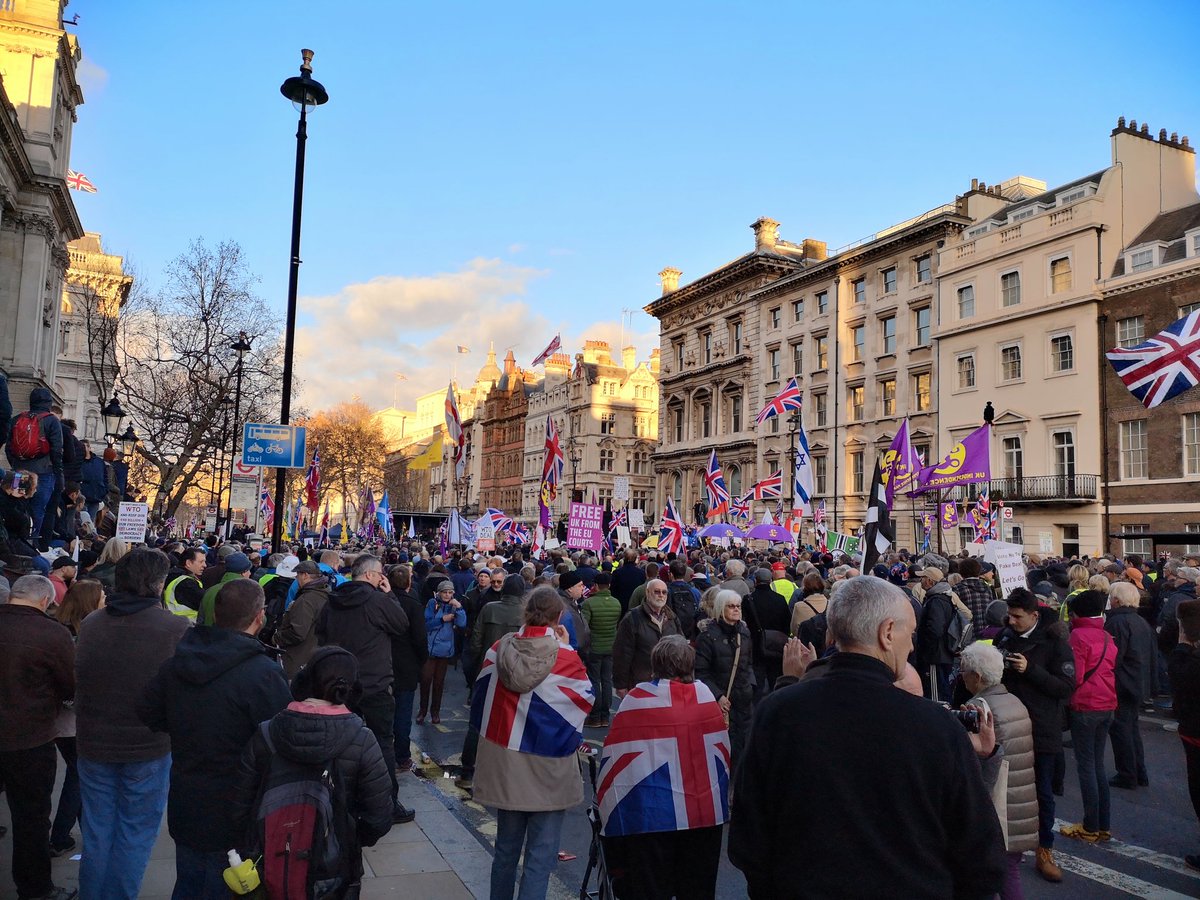As useless “Tommy Robinson” fails to besmirch Brexit, the writing is on the wall for his enablers
In the end there was no violence during UKIP’s “Brexit Betrayal” march and rally, but then the psyop was much more sophisticated than that. Thanks to the event being a dismal failure beyond expectation – and we’ll get into justification for that assertion momentarily – the political ambition of millions of Britons to leave the EU did not suffer the tarnishing that had been planned for it. The same, however, cannot be said of UKIP, for whom, upon the completion of their Whitehall wake, marchers – or coffin followers – should have wend their way to Highgate Cemetery in order to consign the corpse of prematurely dead political party to the ground.
When the actor who plays “Tommy Robinson” first took to the podium for the first of a series of speeches by the barrel scrapings of UKIP’s reserve (all the talent has quit), and Sargon of Akkad (preposterously), he said that he did not want it to seem as if he was jumping on the Brexit bandwagon (as reported in live coverage by the Independent). And yet that was exactly what he was doing; or rather, he was being placed in said circus parade conveyance by handlers whose motives clarified into plain view as events unfolded in London on Sunday 9th December.
The big clue was in the corporate-media’s angle of coverage of the day: a lot of focus was given over to a counter-demonstration, organised jointly by Momentum, a suspiciously non-organic looking Labour grassroots group, and the infamous Unite Against Fascism. The motto of the counter-protest was “Stop Tommy Robinson”. The Guardian obtained a statement from Momentum’s national coordinator, Laura Parker. She said:
I just think it’s really important that everyone from Labour, from the broader Labour movement, from the trade union movement comes out and makes it clear that we will not have fascists on the streets of Britain in 2018.
Then there was this, as reported by the BBC:
Weyman Bennett, joint convener of Stand up to Racism and one of the counter-march organisers, said: “I believe that the majority of people in this country reject fascism and racism.
“There’s deep concern in Britain about the growth of the far right in this country, under the guise of Tommy Robinson and Ukip.”
Finally, this from Shadow chancellor John McDonnell (who “had urged Labour supporters to march against the ‘poison’ of Mr Robinson”):
This march isn’t about Brexit, it’s about far-right extremists dressing up in suits and pretending to be respectable.
Placards were carried with the slogans “smash fascism and racism”, and “migrants and refugees welcome here”, and “no to racism, no to fascism”. And the idea that the day was not actually about “Tommy Robinson”, but about this reaction to him and all that he represents was reflected in the headlines of a number of corporate-media articles: “Thousands protest against Tommy Robinson’s Brexit betrayal march in London” – The Telegraph; “Thousands protest against Tommy Robinson ‘Brexit betrayal’ march” – ITV; “Tommy Robinson ‘vastly outnumbered’ by people marching against him” – the Metro; “Thousands protest against Tommy Robinson Brexit march amid Tory infighting” – The Guardian.
What had been achieved should be simple to see. The Brexit-supporting march was defined in terms of the reaction to it. Now, it should be equally clear to understand that such a thing could never happen if the accusations of racism and fascism coming from this counter-protest were completely without foundation. However, with “Tommy Robinson”, and his BNP, EDL, Pegida, Generation Identity, “at war with Islam” baggage, sitting in the front seat of that aforementioned bandwagon, then there is nothing else but fertile ground for the assertions of anti-fascist protesters to take root.
Moreover, at the same time in another part of London, a rally of 2,500 was being held at something called the ExCel Centre by two pro-EU groups, the People’s Vote and Best for Britain. It might be fair to say that this event might not have received quite as much attention had it not been for the main attraction taking place down at Whitehall. As it happened, many a live coverage thread in corporate-media could suddenly bring news of Michael Heseltine, Caroline Lucas and Vince Cable, and a message about the EU being the stuff of the hopes and dreams of the youth. Philip Lee, a Tory MP, could reach a wider audience with appeals to the lost sheep to rejoin the fold:
I think a People’s Vote is the best hope that we have of reuniting our country after this sorry episode.
Let’s grasp this opportunity, let’s take back control, let’s have a People’s Vote.
In conclusion, then, what we appear to have seen is a very sophisticated psychological operation over the course of an entire day’s events. In Whitehall, a protest for Brexit by people labelled racists represented the notion of leaving the EU as unnecessary trouble caused by disreputable and nasty people whose fomenting of strife justified good people coming into the streets to teach corporate-media consumers that there is a taint to Brexit which should elicit strong feelings of repulsion. Meanwhile, elsewhere, but not too far away, in the professional surroundings of an auditorium, a tonic is offered for the anguish, turmoil and national angst as perceived to be manifesting in the occupation of the streets by ugly haters: an opportunity of cleansing for those who would be feeling soiled by their Brexit choices that had led to this “sorry episode”.
The reader should understand that the campaign for a second referendum is in fact, primarily, a fear-motivator, or pressure group, so that the pro-Brexit public will accept a bad Article 50 deal instead of the much more preferable no deal exit. That being said, the pressure being exerted might be brought to bear fruit if so required, and thus it would be important for the British Government to encourage support for the project, and at least create expectation for the prospect of a second referendum. In short, then, the whole day, with “Robinson” and the defiled UKIP playing their parts, was subtle manipulation to create a desire for Parliament to act on Tuesday, the day that the House of Commons votes upon the non-Brexit dictated to London by Brussels for the benefit of the EU, to end all of the torment.
The great news is that the UKIP and “Tommy Robinson” didn’t hold their end up†. Corporate-media, which would be looking to magnify the scale of the manifestation of national turmoil, tended to describe attendance at the Whitehall rally in terms of “thousands”, which provokes ideas of football stadia full of people. However, it appears that it was felt quite early on that gross exaggeration just would not be got away with: reports emerged of 3000 people on the march. In truth, looking at the image below, posted to twitter by one Damian Gayle (Guardian reporter), if there were only 2000 people in attendance for UKIP’s Brexit Betrayal march, they were made to look like a lot more by cunning angles of photography. There should be no surprise at this. The entire “Tommy Robinson” arrest psyop was a pretence of populism that never had any basis in reality, and so it continues as it is welded to UKIP’s death throes.
In any case, even 3000 is a poor showing, not just because of its own sake, but because the counter-demonstration claimed to have brought 15,000 people onto the streets of London. The significance of this number in measuring the extent of the “Brexit Betrayal” march failure is in the fact that it must have been meant to be more impressive than anything that was expected to emerge on the day in tow of “Tommy Robinson”. The reason for this is simple: the counter-demonstration would always need to outnumber that which it was reacting against as an overt message about its moral supremacy. That means that “Robinson’s” march could have been many thousands short of what had been hoped for and intended. Naturally, this must be a worry for those who plan mass manipulations to expend the energy of unhappy citizens along wild goose chases and up garden paths. Millions of people who are, and will be upset at the Government’s obviously deliberate ignoring of the EU referendum result are keeping their powder dry – and guarding the reputation of Brexit.
On the other hand, UKIP’s days are numbered – and matters were not helped by the stunt that the Batten leadership pulled when “Robinson” appeared on the podium a second time to enjoin the crowd to take to their phones to complete a UKIP membership form (from The Guardian’s live coverage thread, now seemingly disappeared from the internet):
I’d like to ask as many of you to join me with what I’m about to do. I know you’ve spent a lot of money coming here, I know it’s two weeks to Christmas. It’s the price of a beer. The only way for there to be a political option is for the public to support it, back it and join it. I’d like as many of you as possible to get your phone out – it’s £4 a month – and join through the membership with Ukip.
Did the reader catch that “Robinson” wasn’t just conducting a demonstration, but was attempting to join the party himself? Another corporate-media live coverage description of this moment will perhaps make things clearer:
Tommy Robinson… says he’s going to join Ukip as a member. He asks “as many of you to join me in what I’m about to do – go on your phones, go on Ukip’s website, and become a member”…
The rally has gone silent as Tommy Robinson gets his phone out to fill in the Ukip membership form online.
It’s declined his bank details. Shambolic scenes.
Mr Robinson is still not a member of Ukip.
On the other hand, in a write up at the Independent, there was no indication that the outcome had been a negative one:
Speaking from a stage at Whitehall, he told people to sign up on Ukip’s website while appearing to go through the process on his mobile phone.
As the reader may well know, “Robinson” is banned from becoming a UKIP member because of that aforementioned baggage. Even if anyone thought it was a good idea that he should be allowed to join the party, the ruling body of UKIP has decided that there won’t be a decision about waiving the ban until much further down the road. Indeed, the NEC, when securing Batten’s position in a confidence vote last week, made a point about stating that there was no endorsement of the appointment of “Robinson” as Batten’s advisor. Clearly, there was an awareness of things on a knife edge in UKIP – though the NEC’s hedge betting didn’t stop many MEPs and the London Assembly member, Peter Whittle, from quitting the party (and rightly so).
So, what “Robinson” did by trying to join the party, during the rally which effectively caused so many high-profile members to quit, was a very public act of arrogance, and an act of contempt for the ruling body of UKIP, and indeed the party’s rules. It was yet another moment when the Batten leadership treated the party with the utmost contempt and scorn. Now, the author, who stopped being a UKIP member earlier in 2018 when he saw all this coming, cares not if Batten and “Robinson” thumb a nose at the UKIP constitution, or indeed at any decent types who haven’t had the good sense to leave as yet. Those people must look out for themselves. The point being made is that the writing is most definitely on the wall. The end to come is indicated by the decadence in the present. For UKIP, BNP-style obscurity is just around the corner. “Robinson” may well have talked about becoming an MP (so that the corporate-media could frighten its readership with the prospect of him as standing as a UKIP candidate), but the head count at the “Brexit Betrayal” march tells of a different future. As was written before at FBEL, “there are no votes… and there is no future in fighting elections with a brand that so easily invites accusations of racism, and expresses itself in a way that enables the accusations to stick.”
Batten, when he spoke to the gathering in Whitehall, said that he wanted to take as many votes as possible from the Westminster parties (not the first time this low-ambition idea has been expressed). But of course, voting UKIP will not deny approval for the hegemony; it will not deny consent to the system by which voting UKIP has mostly, in the past, been ineffective (with a few exceptions, where there had to be a lot of cheating as a result – see Thanet). At this juncture in history, when the British Government will not carry out a clear instruction in a vital matter concerning each and every person’s self-defence (i.e. withdrawal from the EU and liberation from a tier of authoritarian government), and is engaged in all manner of deceptions to do it with impunity, then withdrawing consent is the only power that a person can wield for self-protection. In the FBEL article from whence came the above quotation, also comes this:
The Government ultimately doesn’t care how you vote, as long as you vote, and you feel that you are participating in representative democracy, and it gets to count your vote. It relies on your misapprehension of a deck stacked against you as your having tried your best, but to no avail, in a system that nevertheless offers a level playing field. The playing field is not level, and you are constantly being cheated.
The Government does care, however, if you do not vote. If you don’t vote, you don’t consent to the Government. If you don’t vote… anything that a charlatan who claims to represent you in Westminster subsequently does, without your consent, to endanger your livelihood will be unlawful, and constitute a crime against you. And when that crime is committed, not just against you as one individual, but against hundreds of thousands, so that a tipping point is reached whereby the State, already delegitimised by mass withdrawal of consent, is not able to maintain a monopoly of force, or unable to wield it because to do so would be to commit more crime, then that’s when you all will be able to act, quite lawfully and reasonably, to realise justice.
The writing is not just on the wall for UKIP. The system is finished: it has shown its true colours, and itself to be an abomination. The Establishment is just waiting, in utmost trepidation, for all those who could act effectively upon the knowledge to realise the fact.
† Update, 13:00, date as published:
And it is with great interest that we see the morning after bringing news of hesitation to proceed with the Commons vote on the Article 50 deal for fear that it will be rejected – or, to look at it another way, for fear that people wouldn’t yet let MPs get away with voting with the government?



















